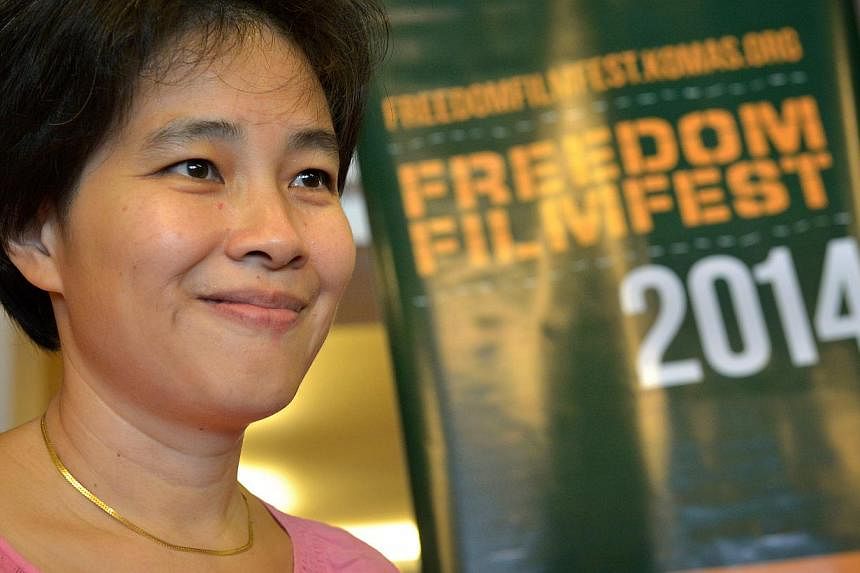Two "B" words marked the cultural scene this year.
One was "ban" - no censorship decision in recent memory has quite galvanised Singapore society like the National Library Board's decision in July to remove and pulp three children's titles featuring same-sex couples and alternative family units.
After a heated few weeks in which a few hundred young parents staged a "read-in" of those titles to their children at the main National Library and thousands signed petitions for or against the National Library Board's move, the board restored two of the titles to the adult section of the library.
The other high-profile ban this year was of local film-maker Tan Pin Pin's documentary feature on political exiles, To Singapore, With Love, for how her sympathetic portrayal of them allegedly legimitises violence and subversion in politics.
While public screenings of the film in Singapore are prohibited, interestingly, the Media Development Authority's ruling allows the holding of private screenings of the film, such as in educational institutions.
The other "B" word which rocked the cultural arena is "boycott".
At least eight writers and cultural figures who objected to the destruction of the disputed children's titles announced their withdrawal from the National Library Board activities and other literary events such as the judging of the Singapore Literature Prize. Such sweeping boycotts, occurring for perhaps the first time in response to a ban, were arguably one of the factors forcing the board's hand.
Taken together, the bans and boycotts show a growing schism in Singapore society on whether controversial cultural works should be symbolically barred from the public arena, with strong views registered on either side.
I say "symbolically" because there is nothing to stop anyone from purchasing one of the disputed children's titles at a downtown bookstore, and Tan's film has already been screened and watched by overseas Singaporeans in Johor Baru, London and at South Korea's Busan Film Festival.
One can argue that as Singapore society simultaneously becomes more conservative and more liberal - depending on which side of the culture wars one stands - bans taken on works with homosexual content are increasingly polarising because government agencies are seen to be validating one group's concerns at the expense of another.
A much more objective and rational approach would be to flag such content for parental guidance or restrict it to mature viewers.
In that vein, going forward, the Minister for Communications and Information Yaacob Ibrahim has said the National Library Board is considering alternatives to pulping offending titles, such as placing them in another section or donating them. It is also mulling the setting up of an external, more diverse panel to evaluate disputed titles - something it should have had from the start.
As for boycotts, I fully expect artists and conservatives alike to continue to exercise their right to protest against a regulatory decision they disagree with, by dropping out of or refusing to buy tickets for an event.
The days of being held back by appeals to social harmony are over; if one feels strongly about something, it is all too easy to find other like-minded folk and organise collective action through social media.
Different but no less complex issues are at stake in To Singapore, With Love. I do not think it deserved to be proscribed, but one can imagine no other outcome right now, given two overwhelming realities.
One is a culture where film-making and film appreciation are still in their infancy, leading to the assumption by the authorities that documentaries should be balanced and dispassionate representations of history, akin to a bloodless textbook or encyclopaedia.
On the contrary, there is a vibrant strand of documentary film-making which challenges that and foregrounds subjective points of view, whose practitioners include Vietnamese Trinh T. Minh-ha and American Michael Moore.
One can see Tan's film as belonging in that category.
The second reality is the historical amnesia inadvertently cultivated over the past few decades, such that the post-1965 generation would watch a film on these exiles and see only these ageing unbowed figures instead of the young agitating upstarts they once were - ready to take up arms or lead strikes at a time when being political was the default mode.
Politics was about playing hardball - detention without trial was among the People's Action Party Government's responses - and underlying these clashes were serious differences of ideology, over how the economy and society were to develop.
One incisive comment I have read on Tan's film comes from veteran diplomat and academic Barry Desker in an interview with this newspaper earlier this month.
To begin, he makes the same point as the authorities, that the film gives no sense of the larger debate surrounding these exiles, who present themselves as victims.
He adds, however, that there has been a larger, collective failure "in underestimating the importance of history" and in not being "open to the varieties of historical interpretations which exist", which has led to "a generation without an understanding of where we come from, what has led to the Singapore that is today".
As a post-65er myself - albeit a former political journalist who had the opportunity to speak with insiders ranging from founding Prime Minister Lee Kuan Yew to historians researching alternative accounts by political dissidents - I think this openness to different views is critical if the generation born after independence is to truly understand this nation and take ownership of and for it.
One suspects this is the reason behind allowing private screenings of the film in schools.
On the invitation of the film-maker, I caught To Singapore, With Love at a private screening a year ago. What stood out for me was not what the exiles had to say - a few such as former student leader Tan Wah Piow have written books that can be easily purchased in bookshops or borrowed from libraries here.
Instead, I found the film a fascinating portrait of individuals for whom Singapore is no longer a country but has taken other forms: a ghost from the past, a moving video of a family member on Skype or a political principle in one's head.
Decades of never returning home have not affected everyone the same way - Tan Wah Piow, for example, has done well for himself as a lawyer in London who occasionally snipes at the PAP from afar. In contrast, Dr Ang Swee Chai, who saw her husband and fellow activist Francis Khoo die in exile, is a haunted, despairing presence and the emotional core of the film.
To Singapore, With Love is also the journey of a post-65 film-maker trying to unearth these alternative accounts.
Tan Pin Pin does not hide the subjectivity of her film and is periodically heard off-camera interviewing the exiles, or being questioned by them.
I hope that the film can come home one day, when Singapore is ready for it.


